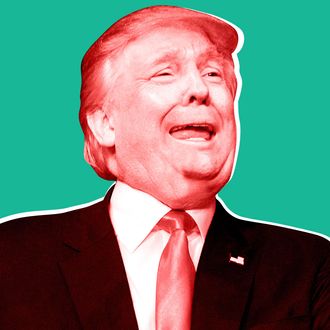
When Donald Trump announced his plan yesterday to ban Muslims from entering the U.S., he earned a standing ovation, suggesting again that a certain section of the population will continue to cheer for him even as his proposals grow increasingly outrageous and dangerous. There are many potential explanations here, but some psychologists are especially interested in one particular aspect of Trump’s enduring appeal: Many of his supporters may be responding to his rhetoric because, as offensive as his statements may routinely be, at least he’s rarely ambiguous.
It’s a concept psychologists call ambiguity intolerance, which is used to describe an individual’s level of comfort with uncertainty. Those with a high tolerance for ambiguous situations tend to view uncertainty as an exhilarating challenge or opportunity; entrepreneurs, for example, are often encouraged to try and increase their tolerance for the unknown. People with a low tolerance for ambiguity, on the other hand, feel very uncomfortable without clear-cut answers or definitions. As psychologist Else Frenkel-Brunswik wrote in a seminal 1940s paper on the subject, people who can’t handle uncertainty also tend to prefer “rigid categorization of culture norms,” such as gender roles.
And so, as psychologist Melanie Tannenbaum recently pointed out in a (terrific) Scientific American series on Trump, it’s “likely not surprising that people with predispositions towards strict social role categorization and wanting a sense of ‘certainty’ would be drawn more to political conservatism than to liberalism, which often values things like fluid conceptualizations of gender roles and the challenging/questioning of traditional cultural norms — the exact opposite of what would make someone high in ambiguity intolerance feel comfortable.”
Some recent work by scientists at the University of Toronto has suggested that some people even prefer outright negative statements over uncertainty. Using brain-scanning technology, they observed stronger responses in their participants’ anterior cingulate cortex — a region of the brain associated with anxiety — when they gave them ambiguous feedback on their performance on a task than when they gave people negative feedback. As the researchers conclude in their paper, some people seem to “prefer the devil they know over the devil they do not know.”
In this way, for the faction of Americans who dislike politicians who deliver complicated, nuanced messages — or intentionally speak in vague terms so as not to alienate any potential voters — “Trump comes across as the ‘dependable’ candidate,” Tannenbaum writes. “For the significant faction of the conservative voter base that will naturally feel quite anxious when things are ambiguous and will cringe at the thought of a politician whom they find difficult to read, a candidate who seems to be ‘putting it all out there’ and provides no room for ambiguity regarding his political positions will be refreshing — and quite desirable.”




